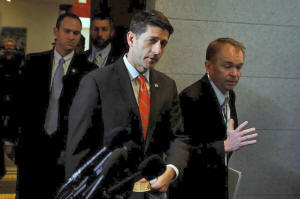|
U.S. tax reform debate moves away from
Ryan blueprint
 Send a link to a friend
Send a link to a friend
 [April 13, 2017]
By David Morgan [April 13, 2017]
By David Morgan
WASHINGTON (Reuters) - U.S. House Speaker
Paul Ryan's tax reform blueprint appears to be losing its status as the
likely framework for the first major tax overhaul since 1986, with rival
approaches emerging from the White House, Senate and other quarters in
Congress.
Congressional aides, lobbyists and analysts say the changing focus could
delay passage of a tax bill until late 2017 or 2018, potentially foiling
Republican efforts to score a legislative victory for President Donald
Trump by August, following last month's failed bill to repeal and
replace Obamacare health insurance.
Like the healthcare bill, the House Republican tax blueprint stems from
Ryan's "A Better Way" legislative agenda launched during the 2016
election campaign.
"The House can go and do what they want to do. We are going to formulate
our own policies," White House budget director Mick Mulvaney told CNBC
in an interview posted on the channel's website on Wednesday. "You will
have a White House, Donald Trump tax plan that we are going to take down
to the Hill and try and sell.
In the meantime, Senate Republicans are expected to review a 2015 tax
package from former House Ways and Means Committee Chairman Dave Camp,
as a starting point for their own tax legislation.
Members of the House Freedom Caucus, a bloc of conservative lawmakers
that helped derail Ryan’s healthcare bill, have also suggested that
expanding the deficit to stave off adding new taxes could be acceptable.

"The blueprint was the Republican ideal, written as a campaign document.
Now they're dealing with the realities of a closely divided Congress and
a president who wants a win on this key, signature issue," said one
business lobbyist, who spoke on condition of anonymity.
But Ryan is not giving up on the idea of forging agreement with the
White House and Senate leaders.
"Our intention has always been and continues to be to coalesce around a
unified GOP plan and those conversations continue," said his
spokeswoman, AshLee Strong.
Business lobbyists and tax experts warn that a loss of focus could prove
fatal for the tax overhaul effort, if the House blueprint disappears
from the political stage.
"Right now the blueprint is the only plan we have. There's a great
amount of uncertainty about how this would play out without it, or
whether this would play out at all," said John Gimigliano, who heads
federal legislative and regulatory services for the accounting and
consulting group KPMG LLP.
[to top of second column] |

Speaker of the House Paul Ryan and Office of Management and Budget
director Mick Mulvaney arrive for a meeting about the American
Health Care Act on Capitol Hill in Washington, D.C., U.S. March 23,
2017. REUTERS/Aaron P. Bernstein/File Photo

Lawmakers on the House Ways and Means Committee say the blueprint's
viability could become clearer next month, when the committee is
expected to hold a series of public hearings and hopes to see a
floor vote before the August congressional recess.
Treasury Secretary Steven Mnuchin met this month with a bipartisan
group of House lawmakers about possibly including infrastructure
spending in an administration tax package, a feature that is not
part of the blueprint.
The House blueprint, which Ryan rolled out last June, would bring
sweeping change to the U.S. tax code by slashing business tax rates
by 15 percentage points, allowing companies to immediately write off
capital investments and ending taxation of foreign profits of
U.S.-based multinational corporations.
But its future has become clouded by mounting opposition to two
provisions that would raise a combined $2.4 trillion to pay for
those tax changes: a border adjustment tax, or BAT, that includes a
new 20 percent import tax and the elimination of business deductions
for interest payments.
Advocates of Ryan’s plan say it would generate revenues that would
help Congress avoid paying for tax cuts by expanding the national
deficit.
(Reporting by David Morgan; Editing by Julia Edwards Ainsley and
Lisa Shumaker)
[© 2017 Thomson Reuters. All rights
reserved.]
Copyright 2017 Reuters. All rights reserved. This material may not be published,
broadcast, rewritten or redistributed.
 |